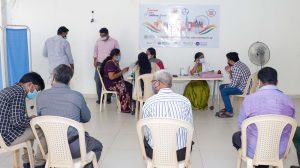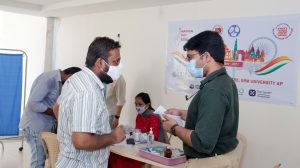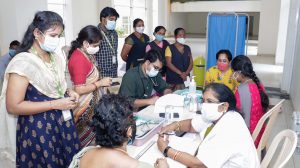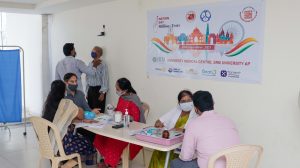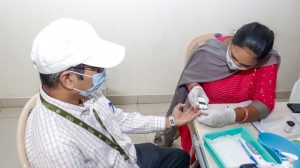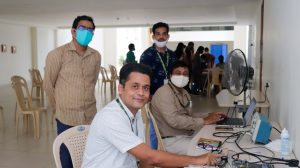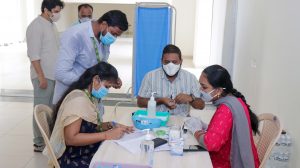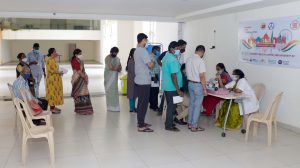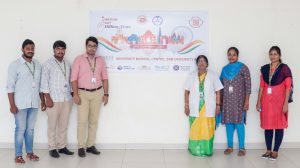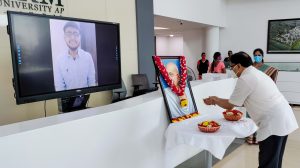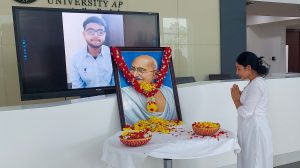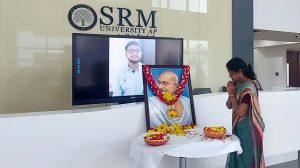SRM University-AP joins in One Nation, One Day, One Million Blood Sugar Tests
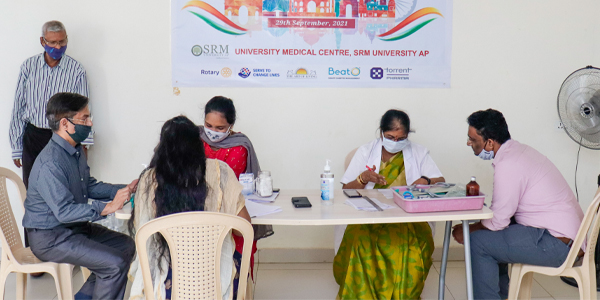 SRM University-AP organised a medical camp, “One Nation, One Day, One Million Blood Sugar Tests”, to spread awareness on Diabetes on World Heart Day on September 29, 2021. The camp was conducted in collaboration with the Research Society for the Study of Diabetes in India (RSSDI).
SRM University-AP organised a medical camp, “One Nation, One Day, One Million Blood Sugar Tests”, to spread awareness on Diabetes on World Heart Day on September 29, 2021. The camp was conducted in collaboration with the Research Society for the Study of Diabetes in India (RSSDI).
Every year on September 29, World Heart Day is observed to raise public awareness about heart disease. One of the primary causes of death from a heart attack is diabetes. India is considered the “Diabetes Capital of the World” since it is home to an estimated 74 million diabetics. Prediabetes affects almost the same number of persons as diabetes. According to various studies, 50 per cent of Indians are undiagnosed, and only 25% of those who are diagnosed are adequately regulated.
Research Society for Study of Diabetes (RSSDI) in India has attempted for the Asia Book of Records for the largest number of blood glucose testing in one single day on September 29, 2021, as a diabetes awareness drive named ONE NATION, ONE DAY, ONE MILLION TESTS. As a part of this, the medical team of SRM University-AP conducted a Diabetes screening test for all the staff, faculty and their family members from 10.00 am – 4.00 pm on the day. Dr Ch Lakshmi Rajyam, Medical Officer of the university, commenced the camp.
Diabetes is a major illness that affects the way our body converts food into energy. When your blood sugar levels rise, your pancreas is prompted to release insulin. Insulin functions as a key, allowing blood sugar to enter our cells and be used as energy. If one has diabetes, the body either does not produce enough insulin or does not use it as effectively as it should. Too much blood sugar persists in the bloodstream when there isn’t enough insulin or when cells stop responding to insulin. Over time, this can lead to major health issues like heart disease and vision loss.
- Published in News
Image retrieval scheme with object detection and quantised colour histogram
 Yuvaraj Tankala and Joseph K Paul, 5th-semester B Tech Computer Science and Engineering students of SRM University-AP, Andhra Pradesh, India has worked with Dr Manikandan V M, Assistant Professor in Computer Science and Engineering Department on a research project and their research paper “A Content-based Image Retrieval Scheme with Object Detection and Quantized Color Histogram” got accepted for publication in the International Journal of Computational Science and Engineering.
Yuvaraj Tankala and Joseph K Paul, 5th-semester B Tech Computer Science and Engineering students of SRM University-AP, Andhra Pradesh, India has worked with Dr Manikandan V M, Assistant Professor in Computer Science and Engineering Department on a research project and their research paper “A Content-based Image Retrieval Scheme with Object Detection and Quantized Color Histogram” got accepted for publication in the International Journal of Computational Science and Engineering.
Content-based image retrieval (CBIR) is an active area of research due to its wide applications. Most of the existing CBIR schemes are concentrated to do the searching of the images based on the texture, colour, or shape features extracted from the query image. In this manuscript, we propose an object detection based CBIR scheme with quantized colour histograms. In the proposed scheme, the meaningful objects will be identified from the query image by using you only look once (YOLO) object detection techniques and the quantized histograms of each of the object categories. The object lists, their count, and the area covered by the objects along with quantized colour histograms will be used during feature matching to retrieve the related images from the large image pool. The experimental of the proposed scheme is carried on the Corel 1K and Caltech image dataset. We have observed an average precision of 0.96 during the experimental study which is quite high while comparing the precision from the well-known existing schemes.
To retrieve relevant images from a large image pool, we use content-based image retrieval (CBIR) schemes. In a CBIR scheme, the properties of the query image will be matched with the properties of the images in the image pool. The images which are very close to the given query image will be returned by the CBIR scheme. Most of the existing CBIR schemes use colour, shape and texture properties for image comparison. In the proposed scheme, we use an object detection-based approach with quantized colour histograms to retrieve the relevant images from the image pool.
The real-life applications of the proposed scheme are listed below:
● In the fashion designing and textile industry, CBIR systems can be used to find the existing designs.
● The CBIR systems are useful in crime prevention by retrieving similar crime scenes or the images of criminal persons based on the query image.
● Professional web designers or poster designers want to retrieve relevant images depends on the specific context that they are working.
● To retrieve similar medical images with the relevant treatment details in a computer-assisted diagnosis system.
The team currently continue their research work in the same domain to come up with a content-based image retrieval system that will return the relevant images by understanding the relationships among the objects in the image. The classes of the objects in the scene and their properties also will be considered along with the relationship between the objects in the scene.
- Published in CSE NEWS, Departmental News, News, Research News
IIT Indore Selected Akash Yadav for M-Tech Programme with Scholarship
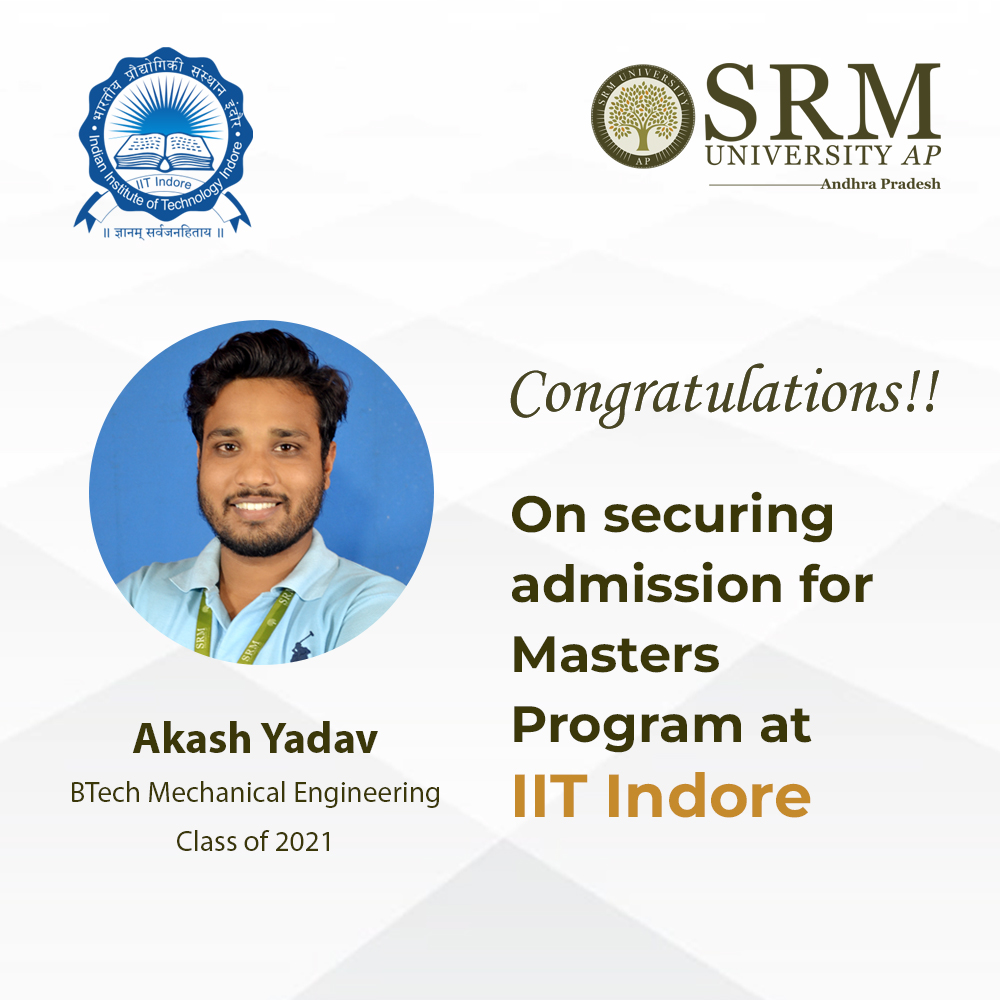 SRM University AP is happy to inform everyone that IIT Indore selected Akash Yadav of our Mechanical Engineering Department class of 2021 into a coveted Master’s Program. Akash is excited to start his M-Tech journey in Production and Industrial Engineering Program at IIT Indore in Madhya Pradesh.
SRM University AP is happy to inform everyone that IIT Indore selected Akash Yadav of our Mechanical Engineering Department class of 2021 into a coveted Master’s Program. Akash is excited to start his M-Tech journey in Production and Industrial Engineering Program at IIT Indore in Madhya Pradesh.
Indian Institute of Technology, Indore or IIT Indore was established by the Government of India for Engineering Studies to provide research-based education. It has become one of the pioneer research institutes in the country and is known for its innovation driven research and entrepreneurship.
Getting selected into IIT Indore is not the first of Akash’s many successes. Akash hails from Nepal and is a recipient of a prestigious scholarship under “Dr. Homi Jahangir Bhabha Scholarship Scheme” from Embassy of India, Kathmandu for his higher education. This scheme provides full scholarship to all students and even provides stipend to selected students.
Akash showed tremendous potential and was a feather in the cap of SRM University AP even before getting selected for M-Tech at IIT Indore. Along with pursuing his Bachelor’s degree in Mechanical Engineering, he completed four projects in four years in our labs. His project titled “Experimental Investigation of laminar length for Non-impinging Submerged Jets” was also awarded with a gold medal.
“I cannot forget the conscientious support of my mentors Dr. Prakash Jadhav and Dr. Surfaraz S Halkarni from Department of Mechanical Engineering during my projects.” Akash said, “Research based learning at SRM University AP, is the key to my success.”
We, the SRM Family, wish Akash all the success in his chosen path and are proud to share the table with IIT Indore as his alma matres. We are pleased that our research facilities could accommodate his innovative mind in the classroom and his ideas and designs in our laboratories.
- Published in Mechanical Engineering NEWS, News, Students Achievements
Paying tribute to the father of the nation on his 152nd birth anniversary
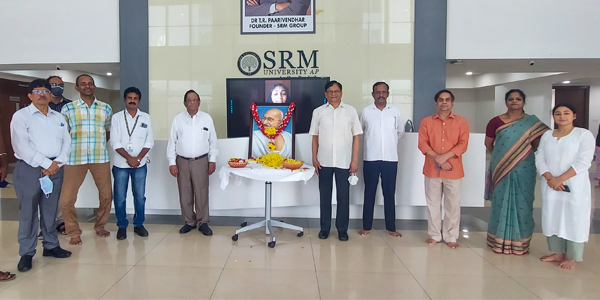 SRM University-AP paid floral tribute to Mahatma Gandhi on his 152nd birth anniversary on October 2, 2021, at the university campus. Vice-Chancellor, Prof V S Rao; Pro-Vice-Chancellor, Prof D Narayana Rao; Director- Campus Life Management, Wg Cmdr Venkataachalam Sekkappan; and Assistant Director- Student Affairs, Ms Revathi Balakrishnan talked about the venerable life of Mahatma that inspired civil rights movements across the world.
SRM University-AP paid floral tribute to Mahatma Gandhi on his 152nd birth anniversary on October 2, 2021, at the university campus. Vice-Chancellor, Prof V S Rao; Pro-Vice-Chancellor, Prof D Narayana Rao; Director- Campus Life Management, Wg Cmdr Venkataachalam Sekkappan; and Assistant Director- Student Affairs, Ms Revathi Balakrishnan talked about the venerable life of Mahatma that inspired civil rights movements across the world.
Every year on Mahatma Gandhi’s birthday, prayer sessions and tributes are held across the country. Mahatma Gandhi, who was instrumental in India’s freedom, is recognised for his nonviolence and truth ideals, which he began to practise early in his life. The ideals of Mahatma Gandhi motivated the freedom fighters to think of “Swaraj” and quietly work for it. Non-violence was his motto and India could free herself from colonial authority without violence because of his ideals.
- Published in News


